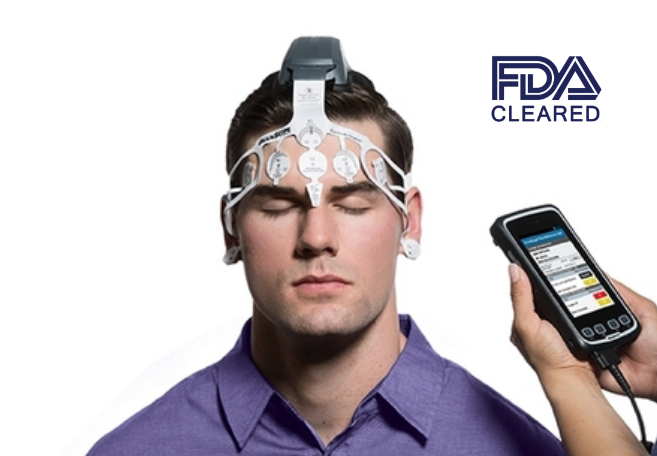An injury to the head is never a simple matter. Depending on the traumatic brain injury (TBI) diagnosis, it can either be mild, moderate, or severe. Thankfully, the human body has some protection from trauma, such as the human skull, which provides adequate protection for the brain inside it. According to the CDC, 70% to 90% of TBIs evaluated in the Emergency Department (ED) are considered mild traumatic brain injuries (mTBI) or concussions. As such, chances of concussion recovery are greater with early intervention. However, to obtain an objective diagnosis of concussion, patients need immediate medical attention to assess the injury’s severity.
Current Concussion Diagnosis Tools
Any injury to the head should receive a prompt evaluation even if there are no visible symptoms. This helps rule out any issues that place the patient in immediate danger. More importantly, some symptoms do not present themselves at the time of the injury and may appear later. Left undiagnosed and untreated, head injuries may lead to more significant issues such as undetected bleeding in the brain or long-term effects such as Post-Concussion Syndrome.
Typical protocols rely on self-report and include using a Glasgow Coma Scale (GCS) score to assess the severity of the injury. With the GCS, patients are given a score on their eye, motor, and verbal responses. The total score will determine if the patient suffers from mild (13-15), moderate (9-12), or severe (1-8) TBI. While the GCS is reliable in determining a patient’s’ level of consciousness and the vast majority of head-injured patients are classified as mild on the GCS, many factors can influence the results, including alcohol consumption, medication, hypoxia, and hypotension.
Another test used in assessing head injuries is the Standardized Assessment of Concussion (SAC). SAC is a brief screening tool that focuses on the cognitive domains and symptoms most commonly associated with concussion. While effectively assessing cognitive dysfunction, patients with heightened mental states at the time of injury can under or over-report the number and severity of symptoms.
Why Early Detection of Concussion Diagnosis is Important
Even with a correct diagnosis, complete concussion recovery can remain elusive as head injuries can lead to persistent symptoms and potential long-term severe neurological conditions. These include impaired cognitive function, movement coordination, social behavior, and an overall decrease in quality of life. Further problems can arise from undiagnosed or late diagnosis of concussion.
Symptoms of Concussion
Symptoms of a concussion may include the following:
- Temporary amnesia
- Confusion
- Disorientation
- Blurry vision
- Headache
- Dizziness
- Nausea
- Vomiting
For the first 24 hours, it is essential to monitor the patient closely for worsening or new symptoms.
Preparing Patients for Concussion Recovery
The majority of patients suffering from a concussion recover in one to two weeks. Depending on the severity, recovery can have two or three phases.
Phase 1: Acute
The acute phase is the initial period of recovery where the patient still exhibits symptoms. The patient requires physical and mental rest to recuperate, although this no longer includes total rest (“cocooning”) as previously believed. Additionally, the patient may be at higher risk for a repeated injury due to neurological symptoms. For instance, a dizzy spell due to a concussion may cause slips and falls and more physical trauma.
Phase 2: Recovery
The recovery phase is when the patient feels the subsiding of headaches, soreness, and tiredness. Post-concussion neurocognitive test scores should improve by this time. A gradual return to normal activities, including physical activities, should be monitored by a health care provider. If symptoms recur with activity, the patient should stop that activity and return to Phase 1. The concussion may still affect thinking, attention, focus, memory, learning speed, and mental processing.
Phase 3: Chronic
The chronic phase occurs in some cases when a patient has lingering symptoms that impair cognitive function. An extended leave of absence or homeschooling option may be needed until the patient is entirely free from symptoms. Left unmanaged, chronic sufferers can expect a decrease in quality of life.
Early Detection with BrainScope
Given the possible complications of concussions resulting from delayed or lack of diagnosis, early, objective detection is needed. BrainScope is an FDA-cleared, portable, EEG-based medical device that provides an objective assessment of head injuries at the point of care. In under 20 minutes from patient prep to results, BrainScope produces an accurate patient assessment and determines the likelihood of brain bleed and concussion to aid the clinician in making a clinical diagnosis.

BrainScope can determine the likelihood a patient has a concussion and provides accurate data to help track patients from the time of injury through recovery to aid in return to activity decisions. The device can also perform baseline testing, which is optimal for sports medicine physicians monitoring athletes for concussions. Given that early intervention and diagnosis significantly increases the likelihood of full concussion recovery, an objective, rapid assessment such as BrainScope can help get the patient on the right treatment path.
Development of BrainScope was made with assistance from the U.S. Department of Defense and the GE-NFL Head Health Challenge. To learn more about BrainScope, visit the BrainScope website or request a demo.